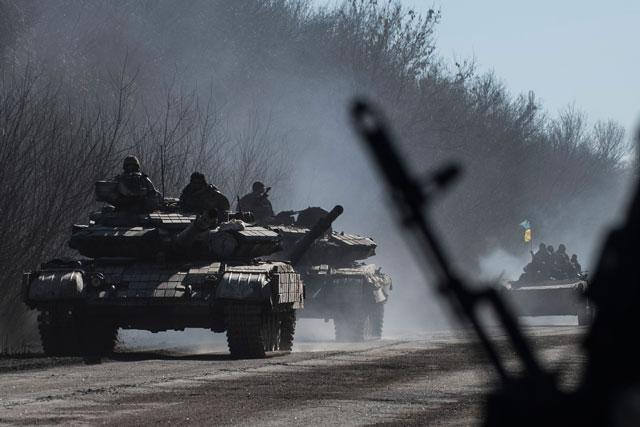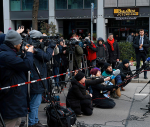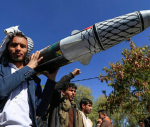You are here
Ukraine's hryvnia plunges after foreign currency auctions scrapped
By Reuters - Feb 05,2015 - Last updated at Feb 05,2015
KIEV — Ukraine's hryvnia currency plunged about 30 per cent against the dollar on Thursday, traders said, after the central bank abandoned the foreign currency auctions that had effectively pegged the exchange rate.
The central bank scrapped the daily auctions, which had set an unofficial peg for banks to follow, and also raised its main interest rate to 19.5 per cent on Thursday as it sought to avert a Ukrainian financial collapse, brought ever closer by fighting in the country's east and a lack of foreign funding.
With the hryvnia declining even before Thursday's drop, and Ukraine's foreign exchange reserves falling to $6.4 billion, barely enough to cover five weeks of imports, the bank has a few ways to revive an economy on the brink of bankruptcy.
The scrapping of the auctions was aimed at closing the gap between the black market exchange rate and the official rate, which the central bank noted would eliminate market uncertainty.
But following the announcement, the hryvnia was trading at 24-25 against the dollar, down about 30 per cent from Wednesday's close, traders indicated.
According to Reuters data, the hryvnia was trading at 23.9 at about 1300 GMT.
"The market is increasingly active, but from the side of buyers [of foreign currency]. There are not many sellers. The true level now is 24 or 25. I cannot say if there are real deals, but they were the live quotes," said one trader.
"The official rate does not yet reflect the real picture, it's far from it," he added.
The central bank raised its key refinancing rate to 19.5 per cent from 14 per cent, to take effect on Friday, as it seeks to curb annual inflation which hit almost 25 per cent in December.
Announcing the measures, central bank governor Valeriia Gontareva told a news conference: "There is still panic on the market, connected with ongoing fighting."
The former Soviet republic desperately needs funds from donors to fill an estimated $15-billion funding gap to withstand the financial crisis, deepened by a surge in fighting in eastern regions where pro-Russian rebels have seized new ground.
But analysts say the renewed fighting, which has all but buried a September ceasefire, makes it more difficult for lenders such as the International Monetary Fund (IMF) to offer funds.
"If there is any worsening of the situation, the National Bank is ready with the tools needed to calm the foreign exchange market," Gontareva said.
She added that the bank was forecasting consumer price inflation this year of 17.2 per cent and warned that inflationary and currency devaluation risks would continue in the near term.
IMF talks tough
Gontareva, a former top executive at Western banks who was appointed soon after President Petro Poroshenko was elected last May, said the bank had agreed terms with the IMF to boost financial aid but gave no figures.
However the terms are unclear, and an IMF team is still in the capital Kiev after extending its mission beyond January 29, a move seen by some analysts as a sign that talks on boosting its financial support are tough.
Ukraine has already received $4.6 billion from the IMF as part of a $17 billion aid programme, but is seeking to extend that programme in terms of time and money.
Some analysts said that without a ceasefire, any foreign financing from the IMF and others would be difficult to secure.
Kiev has said it wants to restore the ceasefire agreed with the Moscow-backed rebels last September in the Belarussian capital Minsk and accuses Russia of sending new troops and arms to help the separatists take ground in eastern Ukraine.
Moscow denies arming the rebels and says it too wants the ceasefire to hold.
Tim Ash, head of emerging markets research at Standard Bank, said Russian President Vladimir Putin was betting that no amount of Western financing would work unless the conflict was halted.
"This is just finger-in-the-dyke stuff. The conflict has to be halted, period," he added in a note.
US Secretary of State John Kerry arrived in Kiev on Thursday for talks with Poroshenko and government leaders. A senior State Department official said Kerry would offer US support for efforts by Ukraine to negotiate a new ceasefire.
Kerry also intends to provide an additional $16.4 million in humanitarian aid to help civilians in eastern Ukraine, US officials said.
Analysts said continued fighting ensured any move by the central bank to secure the economy would fail.
"It's more about economic failings and the war situation at this stage. Interest rates won't make any difference, just as they are not [making a difference] in Russia," said Simon Quijano-Evans head of emerging market research at Commerzbank in London.
Related Articles
A long-awaited truce took hold at last in east Ukraine on Wednesday, with the army reporting no combat fatalities for the first time in weeks, but the news did nothing to halt a currency collapse that forced the central bank to ban most trading.
Ukraine's new energy minister pleaded with industrial and domestic consumers to use less electricity as hard frosts led to a sharp drop in gas stocks and low coal stockpiles, making more blackouts likely.
Pro-Western parties will dominate Ukraine's parliament after an election handed President Petro Poroshenko a mandate to end a separatist conflict and steer the country further out of Russia's orbit into Europe's mainstream.

















